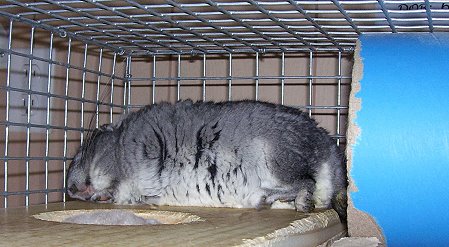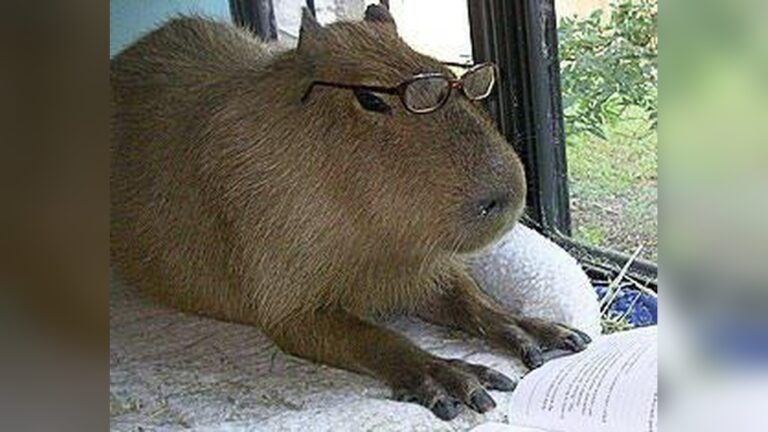Do Chinchillas Sleep: Unveiling Their Surprising Sleep Habits
Have you ever wondered if chinchillas sleep like you do? If you have one as a pet or are thinking about getting one, understanding their sleep habits is key to keeping them healthy and happy.
Knowing when and how your chinchilla sleeps can help you create the perfect environment for their rest. You’ll discover surprising facts about chinchilla sleep patterns that might change the way you care for them. Keep reading to learn everything you need to know about your furry friend’s sleep!

Credit: www.reddit.com
Chinchilla Sleep Patterns
Chinchillas have unique sleep patterns that differ from many pets. Understanding their sleep helps you care for them better. These small animals are active at different times and rest in special ways.
Nocturnal Nature
Chinchillas are mostly active at night. They sleep during the day to save energy. Their eyes are built for low light. This helps them move around safely in the dark. Owners often see them playing or eating after sunset.
Typical Sleep Duration
Chinchillas sleep about 12 to 14 hours each day. Their sleep is broken into many short periods. They rest in cool, quiet places. This helps them stay comfortable and calm. Proper sleep keeps them healthy and happy.
Sleep Cycles
Chinchillas have short sleep cycles. They switch between light and deep sleep many times. This pattern allows quick reactions to danger. Even while resting, they stay alert to sounds. This natural behavior helps them survive in the wild.
Sleeping Environment
Chinchillas need a special place to sleep well. Their sleeping environment helps them feel safe and cozy. A good setup keeps them healthy and happy. Knowing what they like can improve their sleep quality.
Chinchillas have clear preferences for their habitat. They like quiet, dark, and calm areas. These conditions mimic their natural homes in the wild. A peaceful space helps them rest deeply and avoid stress.
Preferred Habitat
Chinchillas prefer cages with soft bedding and hiding spots. They enjoy places that block bright light and noise. Wood shavings or fleece liners work well for bedding. Small houses or tunnels give them privacy and comfort.
Temperature And Comfort
Chinchillas feel best in cool places between 60 and 70 degrees Fahrenheit. Too much heat can cause stress or illness. Use fans or air conditioning to keep the area cool. Avoid direct sunlight and drafts for steady comfort.
Safe Sleeping Spots
Chinchillas need spots where they feel secure. Elevated shelves or enclosed boxes make great safe zones. These spots protect them from sudden noises and other pets. Regular cleaning keeps these areas fresh and inviting.
Signs Of Healthy Sleep
Healthy sleep is vital for chinchillas. It helps them stay active and happy. Recognizing signs of good sleep ensures your pet is well cared for. These signs show your chinchilla is resting properly and feeling safe.
Behavioral Indicators
Chinchillas that sleep well show calm behavior. They remain alert after waking. Playful actions and curiosity are common. Lack of rest causes sluggishness and irritability. Healthy sleep patterns help chinchillas maintain energy. Watch for steady breathing and stillness during rest. These signs mean your pet enjoys quality sleep.
Physical Resting Postures
Chinchillas rest in certain natural positions. They often curl up with their tails around their bodies. Some lie stretched out on their sides. Ears relax and eyes close gently. A relaxed posture shows comfort and safety. Tense or awkward positions may indicate discomfort. Observing these postures helps monitor sleep quality.

Credit: www.foreverfeistychinchilla.org
Factors Affecting Sleep
Several factors influence how chinchillas sleep. Understanding these can help owners provide better care. Sleep quality impacts their health and happiness.
Chinchillas need a calm and safe place to rest. Changes in diet, stress, or health can disrupt their sleep. Knowing these factors helps create a good sleep environment.
Diet And Activity Levels
Chinchillas are active mostly at night. Their diet affects their energy and rest cycles. High sugar or fatty foods can cause restlessness. A balanced diet with hay and pellets supports steady sleep. Exercise also helps chinchillas sleep well. Without enough activity, they may become restless or bored.
Stress And Noise
Chinchillas are sensitive to loud sounds and sudden movements. Stress from noise or changes in their environment can disturb sleep. They need quiet and calm surroundings to relax. Consistent daily routines reduce stress. Avoid loud music or frequent loud noises near their cage.
Health Conditions
Illness can affect chinchilla sleep patterns. Pain or discomfort may cause them to wake often. Common problems include dental issues and respiratory infections. Regular vet checks ensure early detection of health problems. Healthy chinchillas tend to have regular, peaceful sleep.
Tips For Better Sleep
Good sleep is important for chinchillas. It helps them stay healthy and happy. You can help your chinchilla sleep better by making some simple changes. These tips focus on comfort and routine. Follow them to improve your pet’s rest.
Creating A Restful Space
Choose a quiet place for your chinchilla’s cage. Avoid noisy or busy rooms. Use soft bedding that feels comfortable. Keep the cage cool and dry. Make sure the area is dark during sleep times.
Establishing A Routine
Set regular times for feeding and play. Chinchillas like routine and feel safe with it. Try to keep their sleep and wake times consistent. This helps their body clock stay steady. A calm environment before sleep also helps.
Avoiding Common Mistakes
Do not disturb your chinchilla during sleep. Loud noises and sudden lights cause stress. Avoid placing the cage near direct sunlight or heaters. Overhandling at night can keep them awake. Keep the cage clean to prevent discomfort.
Comparing Chinchilla Sleep With Other Pets
Comparing chinchilla sleep with other pets reveals some interesting differences. Chinchillas have unique sleep habits that set them apart. They are not quite like common rodents or typical household pets. Understanding these differences helps pet owners care for their chinchillas better.
Differences From Rodents
Chinchillas are rodents but sleep differently than many others. Most rodents are nocturnal and sleep during the day. Chinchillas are crepuscular, active at dawn and dusk. They sleep in short bursts rather than long periods. Unlike hamsters or mice, chinchillas do not burrow deeply to rest. They prefer cool, quiet spots and often sleep curled up. Their sleep pattern is lighter and more flexible. This helps them avoid predators in the wild.
Unique Sleep Traits
Chinchillas have several unique sleep traits. They need 12 to 14 hours of sleep daily. Their sleep is broken into several naps, not one long sleep. They can wake quickly from sleep if disturbed. This alertness is a survival trait. Chinchillas also prefer cooler temperatures for sleeping. Heat can cause stress and disrupt their sleep. Their dense fur keeps them warm but also makes them sensitive to heat. These traits make chinchilla sleep quite different from dogs, cats, or rabbits.

Credit: www.whimsysmenagerie.com
How Smart Pets Lover Can Help You with Do Chinchillas Sleep
Learning from Chinchilla Sleep Habits
Understanding do chinchillas sleep and their unique sleep patterns opens up valuable lessons for any pet parent. Just like the sleeping environment plays a crucial role in ensuring your chinchilla’s rest, it reminds us how important a calm, cozy space is for all pets. Observing the signs of healthy sleep in chinchillas—such as their relaxed posture and quiet breathing—can sharpen your ability to recognize when your furry companions are well-rested or need attention.
At Smart Pets Lover, we believe that every pet’s sleep tells a story, and by tuning into these subtle cues, you can deepen your connection with them. Whether you’re caring for a chinchilla, dog, or bird, creating a peaceful environment and understanding their natural rhythms helps promote better overall health and happiness.
If you ever feel unsure about your pet’s sleep habits or want more tailored advice, reaching out to trusted pet care experts can offer peace of mind and practical solutions. After all, responsible pet ownership thrives on knowledge and empathy—qualities that make every wag, purr, and chirp truly meaningful.
Frequently Asked Questions
How Many Hours Do Chinchillas Sleep Daily?
Chinchillas typically sleep 12 to 14 hours each day. They are crepuscular, meaning they are most active at dawn and dusk. Their sleep is spread across day and night, often in short naps rather than one long sleep period.
Do Chinchillas Sleep During The Day Or Night?
Chinchillas mainly sleep during the day and stay active at night. They are crepuscular animals, so they prefer dusk and dawn for activity. This natural pattern helps them avoid predators in the wild and suits their pet behavior.
Where Do Chinchillas Prefer To Sleep?
Chinchillas prefer dark, quiet, and cozy places to sleep. They often choose hiding spots or enclosed nests within their cage. This environment makes them feel safe and comfortable, mimicking their natural rocky crevices in the wild.
Can Chinchillas Survive Without Much Sleep?
No, chinchillas need consistent sleep to stay healthy. Sleep helps them maintain energy, regulate body functions, and reduce stress. Lack of sleep can lead to health problems and behavioral changes in chinchillas.
Conclusion
Chinchillas sleep mostly during the day and stay active at night. They need quiet, dark places to rest well. Understanding their sleep habits helps you care for them better. Respect their natural rhythms for a happy pet. Watching them at night shows their playful side.
Sleep is important for their health and mood. Keep their environment calm and comfy for good rest. Knowing this helps you enjoy your chinchilla more. They sleep a lot, just not like humans do.





